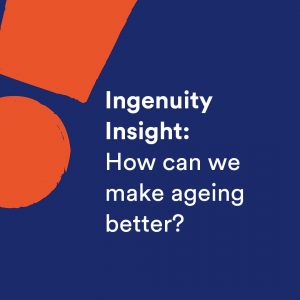Taking action today for all our tomorrows – how we can make ageing better?
Insight from Jemma Mouland – Centre for Ageing Better
We are experiencing a huge demographic shift, living ten years longer than our parents’ generation on average and nearly two decades longer than our grandparents’ generation. This is quite an incredible feat.
However, the doom and gloom narrative of the ‘burden’ of an ageing population is all too familiar still. No doubt many of you have seen this demographic shift described as ‘ticking time bomb’ with disastrous impacts for our economy and health system. Recent media coverage around covid-19 has only served to entrench these negative attitudes towards ageing further.
This narrative is not only incorrect, its damaging. At the Centre for Ageing Better we recognise that our longer lives are a huge opportunity, for us as individuals and for society and the economy at large. Indeed, Anna Dixon our CEO has just written a book about exactly that!
However, significant inequalities exist in our later years. As we get older, the accumulation of a lifetime of advantages or disadvantages, together with differences in our ethnicity, in where we live and in our income, results in vastly unequal levels of health, wealth, happiness and security in later life.
What does it mean to age well?
At the Centre for Ageing Better, our vision is a society where everyone can enjoy later life. We believe we can have greatest impact by focusing on supporting those who are approaching later life.
By 2040, we want more people in later life to be in good health, financially secure, to have social connections and feel their lives are meaningful and purposeful. To achieve our long-term vision we believe change is needed to enable more people approaching later life to:
- Live healthier, more active lives, reducing the risk of poor health, delaying onset, progression and impact of disease and disability
- Be in good quality work for longer, boosting savings and delaying drawing pensions
- Live in safe, accessible and adaptable homes, remaining independent and active for longer
- Live in communities where social relationships flourish, making it easier to build and maintain close connections as well as wider everyday contact.
The impact of Covid-19 on later life
Covid-19 has highlighted the terrible impact of failing to tackle inequalities and supporting people to age in better health. Recent research we’ve conducted shows that people in their 50s and 60s think their mental and physical health has declined during lockdown. People’s financial stability has also been hit hard, with almost half expect their finances to worsen, and of those who are furloughed less than 40 percent expect to be employed in the future. We’ve also seen a dramatic shift in how we connect, and the importance of having access to digital technology to enable us to remain connected.
How can products and services make a difference?
There’s a real need, and huge opportunity, for new products and services that can help us to all age well. We’ve outlined seven of the key areas for innovation to support healthy ageing that we think more people should be focusing on.
As entrepreneurs who may be thinking about, perhaps for the first time, how you can support more people to enjoy later life, you must be aware of some common traps that many innovators fall into. Our recent review of the healthy ageing innovation and investment landscape identified some key issues including:
- Ignoring the diversity of the older population – too often, over 50s get treated as a homogenous group, despite being a hugely varied and diverse part of the population. We need to see better co-design, where products are designed with the end user, building on a clear understanding of their needs and preferences. We also need products that are informed by better market research and customer segmentation.
- Age-related stereotyping – too often, ageing is still treated as synonymous with frailty and decline, and at best with a ‘doddery but dear’ This has resulted in innovation activity focusing on treatment and management of severe decline in capacity, rather than prevention or the positive promotion of active, healthy living. We need more aspirational products and services that help us to enjoy and extend our healthy later years, not simply manage declines in health when they arise.
- Focusing on technology and technology alone – widgets and apps are not the answer. Many in later life are not digitally engaged, and so tech first-and-only responses risks exacerbating inequalities. We have to recognise that individual tech products will only take us so far in transforming our experience of later life. We also need to innovation in how our wider systems and services work; everything from our employment practices and education system, to housebuilding and planning, through to the funding and commissioning of transport.
We all have a role to play. After all, this isn’t about innovating for ‘others’. This is about innovating today, for all of our tomorrows.
Biography
Jemma leads on the Centre for Ageing Better’s innovation work, fostering the development of new ideas across their priority areas. She works on their agenda to bring about change by working closely with partners and people with lived experience to develop forward-thinking ideas which provide practical, scalable solutions.






